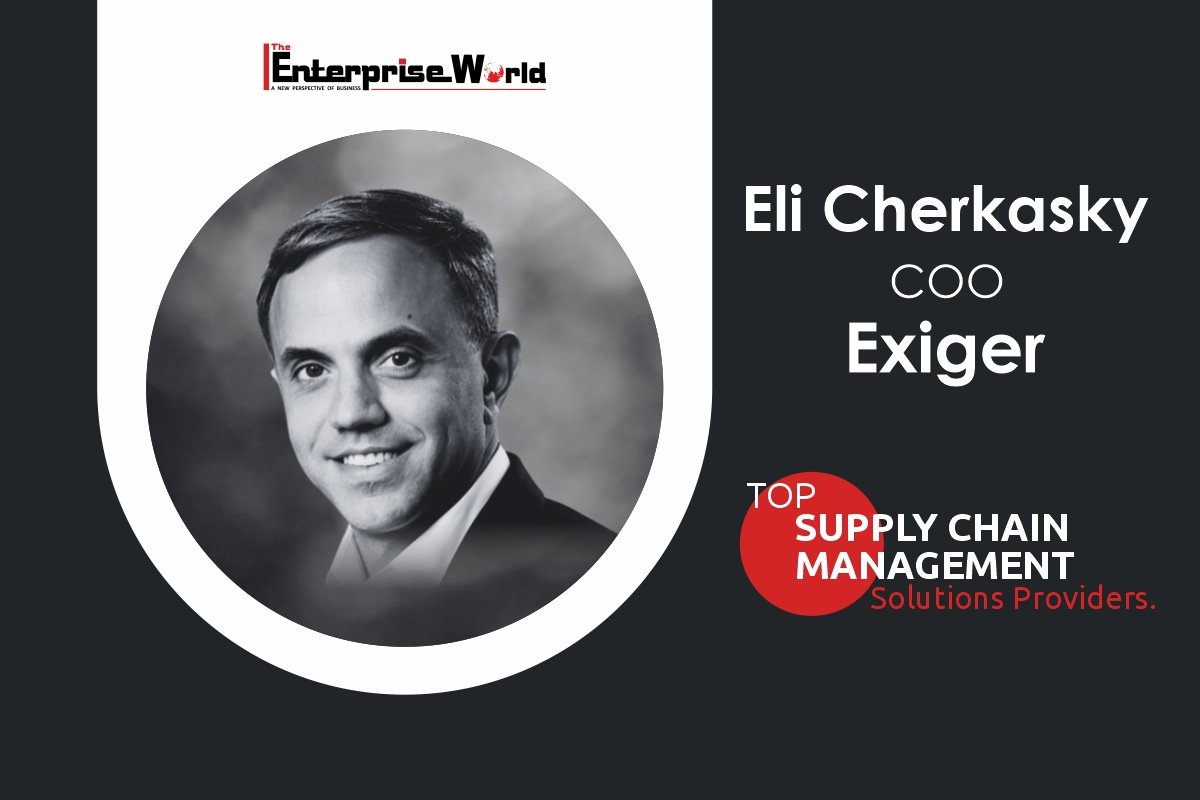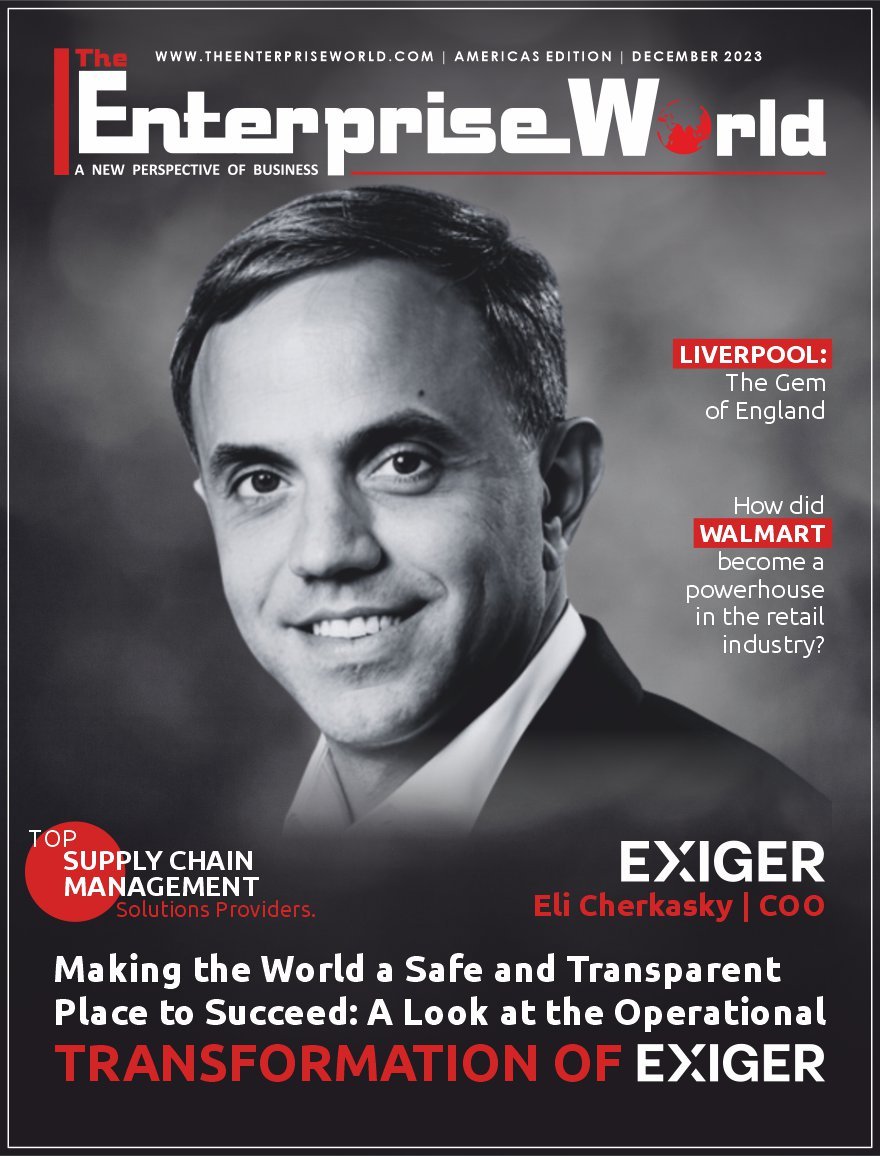Supply chain visibility has gone from a nice-to-have to a must-have for all businesses as the global risk landscape becomes increasingly complex and interdependent. Effective supply chain management has become a prerequisite for managing costs, improving productivity, empowering procurement, avoiding disruptions in production and distribution, achieving sustainability and scalability, and ensuring regulatory compliance.
In this article, we will explore the role of AI in modern supply chain management and look at one of the tech companies at the forefront of this innovation through the lens of their COO, who has led an operational transformation over the past two years.
Featured for The Enterprise World’s issue of Top Supply Chain Management Solutions Providers is the story of Exiger, a company making the world a safe and transparent place to succeed.
Supply Chain Becomes Mission Critical
Exiger’s mission is to make the world a more safe and transparent place to succeed.
Supply chain crises have made headline news for years now – from the pandemic to cyber-attacks to global geopolitical conflicts. The need was apparent. It became clear to the founders that there’s no better place for Exiger to help its customers restore confidence and stability – and to succeed – than in the volatile, highly-regulated supply chain risk management market.
“We’re called to this mission. And by responding to this call with sustainable, sophisticated AI solutions, we’ve been able to play a small part in addressing some of the existential issues that plague society at large like modern slavery and child labor,” said Exiger COO Eli Cherkasky. The biggest asset and – at the same time – the biggest problem businesses face today is the sheer volume of data they encounter on a daily basis. Today’s supply chain stakeholders (supply chain officers, procurement officers, CISOs, compliance leaders and counterintelligence officers) are drowning in more data than they could ever hope to manage.
That’s where Exiger’s solutions come in. The team realized that in building a supply chain technology business, the key was to get the customers closer to trustworthy, understandable and actionable insights to make critical business decisions fast, rather than giving them more data.
Exiger’s X Factor: What Differentiates the Company from its Competitors?
Exiger is the only platform that offers companies end-to-end supply chain management solutions. Their products span everything from supplier vetting and risk management all the way through operational orchestration of supply chains. Additionally, it is the only platform where customers can address every type of supply chain issue and make all of their supply chain decisions within their 1Exiger platform.
Exiger is also differentiated by its award-winning AI. “Our tech is truly at the cutting edge of natural language processing,” said Cherkasky.
The company has built an open-source platform that does not require indexing, constant maintenance, continuous data normalization or even data warehousing for it to be effective. Exiger has reinvented the way organizations manage structured and unstructured data. On the fly, it can tell you who your current suppliers are, who your current partners are, and who your current customers are – assessing an enormous volume of data.
“Another factor that has always differentiated Exiger is the fact that we are practitioners.”
Exiger is not just deploying tech for tech’s sake. They are using the technology to further empower risk management. The team understands not just the supply chain, but also the needs of all the stakeholders within the customer’s organizations.
“We’ve also worked with the U.S. Federal Government to create the gold standard of proprietary risk scoring models that can be applied to all industry participants,” added Cherkasky.
Transforming the Organization
Cherkasky is responsible for global shared services – the functions that serve as the backbone of the organization. This includes everything from talent & culture and training to IT. Cherkasky’s team’s primary job is to empower every team member to give their best, learn more and hit new professional heights while ensuring they have all the functional capabilities to do their job.
With this mission as their North Star, the team has embarked on several coordinated operational initiatives over the past two years to achieve cost savings across the business while also investing back into the employees.
“We’ve changed the way the organization purchases data to make more of our contracts fixed and fully leverageable, allowing us to realize greater scale. We also reduced data and hosting costs through a series of measures, including process improvements and software development. This simultaneously drove productivity gains by augmenting training, standardizing and amplifying our product offering, and implementing workflow changes. These initiatives delivered nearly $20 million in annual cost savings,” said Cherkasky.
These valuable savings allowed Exiger to achieve profitability and reinvest in the things that matter most to the team and to Exiger as a whole: Growth – through sales and marketing; the product – through a UX redesign and AI development; and, most importantly, its people – through better health insurance, salary increases and other benefits like discretionary time off.
Cherkasky says the leadership team at Exiger take their responsibility very seriously, and that has been the most rewarding thing, as their efforts have been able to pay dividends to the business and in employees’ lives.
Cherkasky’s Advice to the New Entrepreneurs
“So many companies in the tech space put technology first when really people are your most valuable asset. This is a people business – we’re serving our employees who create and deliver technology. We’re serving the people in our customers’ organizations that deploy our technology. And we’re serving the people that are the end beneficiaries of our technology, whether that means their healthcare data is more secure, their products are free from child labor or they’re liberated from modern slavery.”


